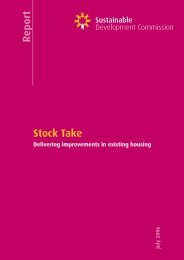Every Child's Future Matters - Sustainable Development Commission
Every Child's Future Matters - Sustainable Development Commission
Every Child's Future Matters - Sustainable Development Commission
You also want an ePaper? Increase the reach of your titles
YUMPU automatically turns print PDFs into web optimized ePapers that Google loves.
absence” 78 of an environment focus within ECM,<br />
and within existing Children and Young People Plans<br />
(CYPPs) in local authorities, is concerning for at least<br />
two reasons. Firstly, as we have already highlighted,<br />
there is strong evidence that the environment<br />
makes an important contribution to the wellbeing<br />
of children. Poor environmental quality simply<br />
inhibits the delivery of ECM. Secondly, in the wake<br />
of the Stern Review, 79 the economic and social<br />
implications of climate change are well established.<br />
It is increasingly hard to envisage children’s policy<br />
without taking this into account.<br />
The opportunity, then, is to recognise sustainable<br />
development and ECM as mutually supportive<br />
initiatives, the former providing a powerful vehicle<br />
for delivering the latter. However, it should not<br />
be assumed that action is required only by those<br />
delivering specialist sustainable development or<br />
environmental services. Nor should it be the sole<br />
responsibility of children’s services teams as many<br />
of the environmental factors affecting children lie<br />
beyond their immediate influence. The government’s<br />
recent guidance for local authorities on ‘sustainable<br />
communities’ points to the need for cooperation<br />
across a broad-based alliance of players from citizens<br />
to community groups, local to central government,<br />
and public, private and voluntary sectors. 80<br />
Insufficient collaboration at a strategic level<br />
was one of the key barriers identified by our local<br />
authority participants. 81 While some elements of ECM<br />
service delivery are benefiting from a sustainable<br />
development approach, progress is often held<br />
back by the lack of systemic involvement across<br />
children service departments, the local authority<br />
as a whole and its relationships with local partners.<br />
It is vital that political leadership and the initiatives<br />
of individual local authority departments dovetail so<br />
that the actions of one do not cancel out the others.<br />
The refurbishment of a park led by community<br />
renewal officers may have little or no impact if the<br />
transport and planning departments are working to<br />
widen the adjacent road to four lanes, increasing<br />
air and noise pollution and reducing the pedestrian<br />
safety of those wishing to use the park.<br />
Enhancing ECM delivery within<br />
the inspection framework<br />
Children’s services teams have many responsibilities<br />
and duties and it is important to ask, if we are<br />
encouraging their use of sustainable development<br />
principles, how this contributes to existing agendas.<br />
Taking each of the five outcomes in turn, this<br />
section suggests ways of embedding sustainable<br />
development as a mode of delivery of ECM. Examples<br />
of practice are linked to a selection of the relevant<br />
‘key judgements’ made by inspectors within the<br />
inspection framework for children’s services. 82<br />
<strong>Every</strong> Child’s <strong>Future</strong> <strong>Matters</strong> 25








